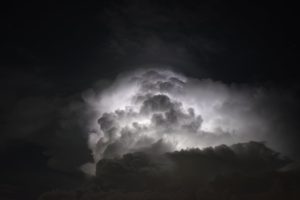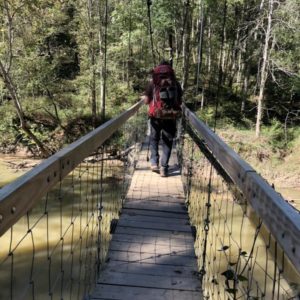After struggling with depression for years, I finally admitted to myself last month that I needed help. Several weeks ago, I fell into a bout of depression so deep that my usual methods of coping—exercising, eating right, getting plenty of sleep, socializing with friends—were simply not working. How bad was it? Picture being wrapped in a curtain of black funk. And then getting stuffed into a locked closet. And that closet is in a dark bedroom where all the shutters are locked shut. And the bedroom is on the third floor of an old abandoned house where the porch is caving in and the windows are all broken. At night during a new moon. Oh, and the sky is blanketed by layers of heavy clouds so you can’t even see the stars. That kind of bad.
I trudged into my doctor’s office, feeling like a total loser. I kept thinking to myself, Maybe I’m just overreacting. I’m just having a bad, what, day? Week? Month? Okay, it’s just been a really bad year so far, that’s all. Any day now, I’m gonna snap out of it. Deep down though, I knew it wasn’t so easy. And this wasn’t the first time. Like I said, I’ve struggled with this for years. Days would go by—weeks at a time even—where I simply couldn’t think, couldn’t concentrate, couldn’t make decisions, couldn’t focus, couldn’t sleep through the night, couldn’t drag myself out of bed in the morning. This was the worst it’d ever been.
My doctor sat me down and asked me a series of questions based on a modified version of the Beck’s Depression Inventory. “On a scale from zero to three, with zero being never and three being all the time, how would you answer the following questions . . .” There’s a table at the end with six categories ranging from normal ups and downs through extremely depressed. My score fell between moderate and severe depression. I cried when she told me. I don’t know if it was relief because there was finally a reason for my feelings, or if it was realizing my depression was much worse than I had ever imagined. I mean, I knew I felt depressed, but I thought I was just being moody, you know? Here was an actual diagnosis from a doctor, and I felt both relieved and terrified.
Why terrified? One of the questions on the assessment is: “Do you ever have thoughts of harming or killing yourself?” She asked the question and I immediately wanted to blurt out, “No way!” But I actually had to stop and think about it. The honest answer was no, I have never had thoughts about actually harming myself or committing suicide. But . . . BUT . . . The truth was also that, if Death decided to come knocking at my door, I’d probably give him a bro hug, invite him inside, and ask him what the hell took him so long. “Did you, like, get lost or something?”
My doctor prescribed a low dose medication for me and I’ve been taking it religiously every day for almost a month now. Am I feeling any better? Eh. A little. Maybe. I don’t feel like I’m wrapped in a black shroud anymore. And someone was at least kind enough to unlock the closet door. The medication takes a long time to build up in your system, and she said I might not notice any results for another six to eight weeks. I cried again when she told me that. I was really hoping she had some miracle drug that would make me feel better in a week. Ten days tops. The thought of enduring another two months of this before I started feeling any better was almost unbearable. I’m a recreational jogger. Actually I’m more of a recreational fast walker/hiker. And my doctor basically just told me I had to run a marathon.
Depression is no joke. Although there are lifestyle choices you can make to help mitigate its effects, it’s not something you can just ‘snap out of’. It affects every aspect of your life and your relationships. One area where depression hurt me the most, surprisingly, was my writing. Just a few short months ago, I launched my website, embarked on a commitment to write 52 stories in 52 weeks, challenged myself to enter the Writers of the Future contest every quarter, and keep writing and submitting new stories to the markets. Things were going well. This bout of depression hit me several weeks ago and everything came to a screeching halt. I didn’t want to do anything. The only thing that got me out of bed in the morning for work was the knowledge that my family depended on me for food and shelter and safety. Most days I didn’t even care about that.
Now that I’m starting to emerge from the funk, what did I learn from all this? Here are five things that depression taught me about writing:
JOY
In his book “On Writing”, Stephen King says, “If you can do it for joy, you can do it forever.” I think the inverse of this is also true. If there’s no joy in your life, you won’t get any decent writing done. I’ve never bought into the image of the tortured artist. Depression and angst and alcoholism and drug addiction and abuse do not make you a better writer. They just make you a writer with a lot of serious mental issues. In my case, depression shut me down completely. On the other hand, writing was also a way to bring me back. At some point during every one of my darkest days, there was this little voice at the back of my head that kept saying, very quietly, “You really should get some writing done.” This suggestion was usually countered by a loud black voice that rose up and screamed back, “And you really should shut the f#%& up!” But that quiet voice was very persistent, and every day it would encourage me to try. After a couple of weeks, I did. A few ideas jotted down here. A couple of sentences written down there. When I’m really on fire, my daily word count goal is seven hundred, and I can usually hit that inside an hour on my lunch break. But at those depressed times, I was lucky to write a ten word sentence. And don’t even think about a full paragraph. Still, it was progress. A few weeks ago, I thought of a story in my world of Bordertown. I’m maybe a third of the way through a first draft, and I’m starting to really enjoy how it’s going. Aside from that, this article is the first thing I’ve written and completed in almost six weeks, and it’s feeling pretty good. It’s easier to write when you’re filled with happiness and joy, but writing can also help you find your way back to happiness and joy again.
INTROSPECTION
Depression is a cauldron of burnt chili, where all your deepest blackest thoughts and emotions get unexpectedly mixed up to the surface. The black crustiness sits atop that surface and you stare at it with an upturned nose and say, “You’re ruined. You’re disgusting. You smell bad. No one’s going to like you. There’s no way to salvage this. Why did I bother trying this in the first place? I can’t do anything right.” It’s like looking at everything you ever did with your life through the purple glare of a black light. The images are dark, and all that stands out are the pee stains and nasty body fluids. This is muddy territory, filled with bogs and quicksand and radioactive water. You don’t want to step in it and you try everything you can think of to get around it. But the truth is you have to wade through it, chin deep. Sometimes there are low spots and you sink up to your eyeballs. You just have to hold your breath and keep moving. But the area isn’t without its treasures and souvenirs. Your characters (or, you know, other real people) will have their own darkest hours and low points and failures and doubts and fears. Now you know what it feels like. You crossed through yourself and somehow made it out alive. You can write with greater honesty, from a place of empathy and experience, because you lived it yourself. Your readers will identify with that, and your story will resonate much more deeply because of it. Just don’t wallow in it. Don’t build a treehouse in the middle of the swamp and live off frog legs for the rest of your life because, as tasty as frog legs are, yeah, that’s just not healthy.
PERSISTENCE
I think it was that quiet little voice at the back of my head telling me to write every day that might have actually saved me. I hated that little voice. I yelled at it. Screamed at it. Swore at it. It infuriated me. Why? Because, as it turns out, it was right. I actually knew it was right all along, but I felt helpless to do anything about it. I had no energy to write. I had no motivation to write. I had no ideas to write about. I didn’t want to write about all the black and hateful things going on inside my head. Maybe I should have, I don’t know. But that little voice didn’t give up on me. It kept at me, every day, chipping away at the wall I had built up until cracks appeared. Through it all, writing was the one thing I REALLY wanted to do, but I felt powerless to do it. There were a lot of days when I asked myself why I’m still writing at all. I’m still not published. I’m way behind on my 52 story challenge. I missed yet another quarterly deadline for Writers of the Future. Maybe I’m just not meant to be a writer. Maybe I should just give it up and try something else. It was the ‘something else’ that stumped me. If not writing, then what? I’ve not discovered anything that makes me happier. There’s nothing else I’d rather do. That little voice already knew all this. He kept at me until I remembered it again too.
SELF-CARE
Let’s face it, writing is a lonely activity. You shut yourself off from the outside world for hours at a time (usually indoors, under artificial lights), type away on your computer or scribble on your notepad, make up imaginary friends to write about, spend days, weeks, months working on a story, send it out into the world, only to have it come back rejected over and over again. We spend a lot of time inside our own heads, always thinking, thinking, thinking. We tend to become self-absorbed and often pay little attention to the real people and events going on around us. All that isolation. All that rejection. All that me, me, me. We need to get outside. We need to get involved. We need to move our bodies and engage with real people. Isolation is exactly what you want when you’re depressed, but it’s also the very worst thing for you. “Why can’t I stay in my pajamas all day long?” you ask, and your spouse reminds you they’re the same pajamas you’ve been wearing all week and they REALLY need to be washed. Take a shower. Brush your teeth. Get outside in the sunshine for a while. For heaven’s sake, put down the bag of poppycock and eat some vegetables for crying out loud. At least an apple. If you really can’t muster the energy to go out, ask a friend to come over and watch a funny movie with you. Do your dishes—all those fruit flies can’t be healthy.
ACCEPTANCE
This is one I struggle with even when I’m not depressed, but it’s especially important to remember during the dark times. It’s okay not to write. IT’S OKAY NOT TO WRITE. Sometimes you just need a break, even from the things you love the most. I love what YA author Mindy McGinnis said about things NOT to do in 2019.
“Don’t grind yourself into the ground. Seriously. One of the worst pieces of advice that I hear is never give up. It’s fine to give up. In fact, it’s healthy. I’ve said it on the show before but it bears repeating. It took me 10 years to get published but I wasn’t sending out queries everyday. A person can only handle so much rejection and stay mentally and emotionally healthy. Take a break sometimes. For months, even. I did. Give up for a little bit. Then jump back in.”
Mindy McGinnis
For me, writing is like the alcoholic’s assurance: “I can quit any time I want to; I’ve done it hundreds of times.” This was by far the longest break I’ve ever taken away from writing. I tried really hard not to beat myself up about it. There are only so many hours in the day and so much you can physically, mentally, and emotionally deal with. If something has to give, it’s okay. And it’s okay if that something is the writing. Another thing Stephen King said in “On Writing” that I will always remember: “Writing is a support system for life; it’s not the other way around.” Writing is important, but it’s not the most important thing in the world. Go easy on yourself and accept there will be days or weeks when you just have to let it go. And don’t beat yourself up about it. Miss it like an old friend—with fondness—and be happy when you finally have time to come back to it.
Did you find these thoughts useful? Have something you’d like to add? Leave a note in the comments below.





Hello Morgan that’s quite a post. I was wondering how you and your writing were getting along. Now it makes more sense. I’m glad you’re getting some help and I totally agree writing can be put to one side temporarily, or for much longer, as needed.
Here in procrastination, or perfectionism land, my short story challenge stumbled and stalled for a couple of weeks but I’m back in the writing saddle [or, I mean, back in my writing chair] and I’m working on story number 15, I think it is, today.
I know we are many time zones apart but if you ever want to shoot the digital breeze, give me a shout and we can have a Skype chat or something like that. No pressure.
All the best, stay in touch.
Hey there Mark! That’s a very kind offer and I may have to take you up on it some time. One thing I definitely need to work on is socializing and making friends, especially other writerly friends.
: “Do you ever have thoughts of harming or killing yourself?”
My first answer was yes. Really frightened me to realise it. Then I got to the same point as you. I wouldn’t deliberately throw myself under the bus but then I wouldn’t rush out of the way either.
Nowadays I’d run like hell out the way.
That first time, when they score you, that’s when it really hits home how much you need the help.
It’s so true and so terrifying! Thank you for chiming in. It’s nice to know we’re not alone in this struggle!